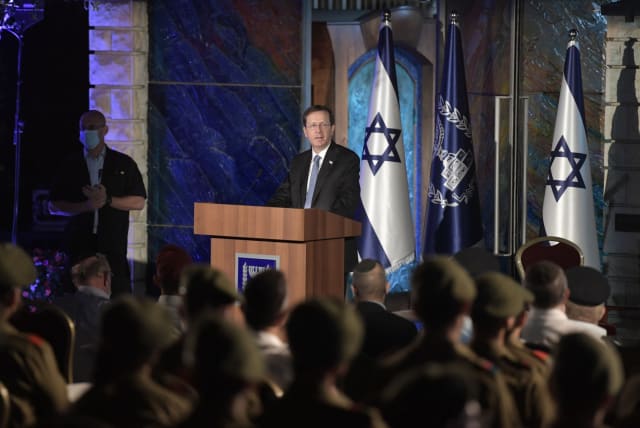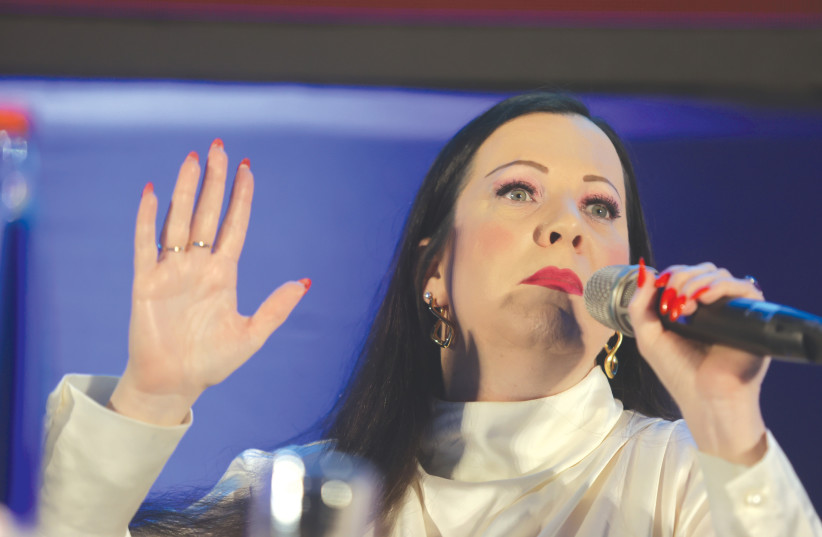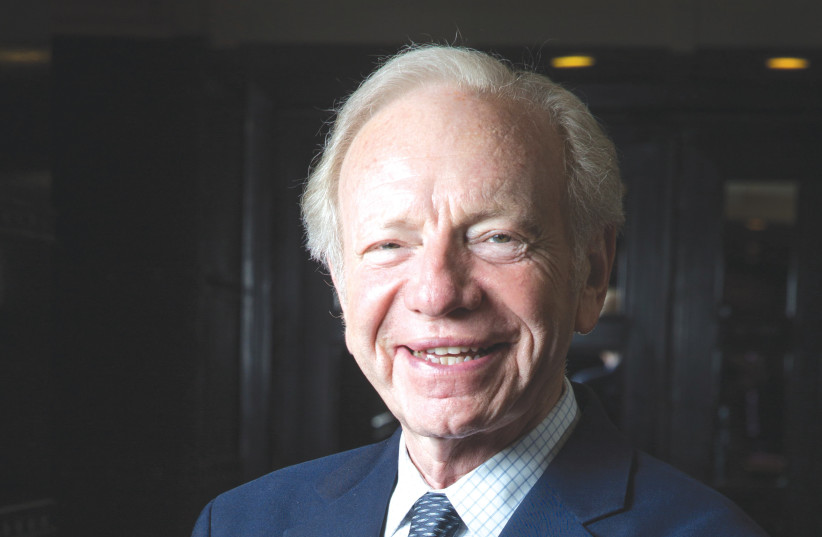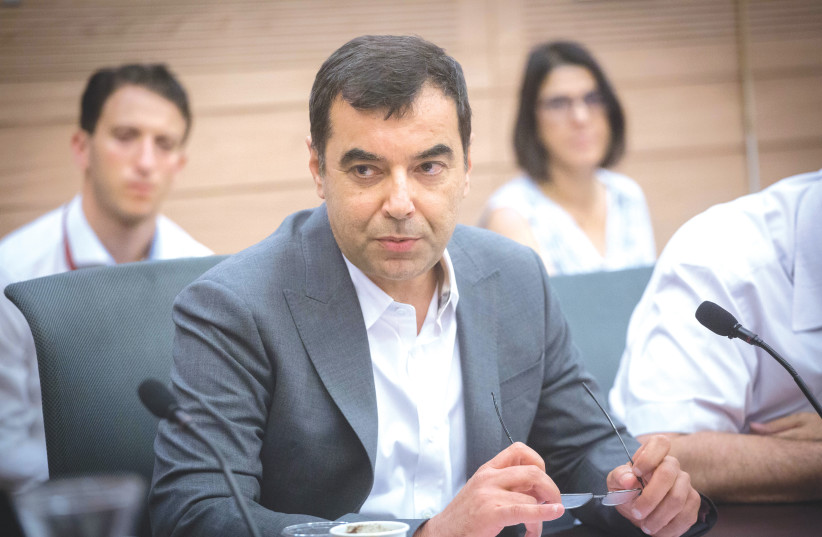Grapevine April 13, 2023: A talent for Torah reading

Movers and shakers in Israeli society.
In the space of less than a week, the Hazvi Yisrael Congregation in Jerusalem’s Talbiyeh neighborhood had two honored guests – each of whom is adept at the proper cantillation when reading the Torah, or its complementary passage. The first was Jerusalem Mayor Moshe Lion, and a few days later, on the first day of Passover, it was President Isaac Herzog.
When the invite came, Herzog had initially said that he would only do the reading and not address the congregation. But once there, having received a very positive reception, he decided that he would deliver a homily after all. He refrained from mentioning any contentious issues and said he was following a presidential tradition of visiting synagogues in the area.
He quoted his grandfather and other sources in relation to Passover customs, but attributed much of what he knew to what he had learned during his years as a student at the Ramaz school in New York, where three generations of the Lookstein family have faithfully served in the development of modern Orthodox Jewish education. Members of the family usually frequent Hazvi Yisrael when in Jerusalem.
Three Herzog generations served the state
It was difficult not to miss the parallel between three generations of the Herzog family, who have faithfully served the State of Israel in religion, defense, diplomacy, politics and statesmanship.
Herzog, who is known for enjoying synagogue services, was trying to focus on his prayer book during an exceptionally beautiful service, but people kept coming up to him to shake his hand and to congratulate him on the stand he has taken with regard to judicial reform, or to offer advice and opinions.
Herzog smiled through it all, but it wasn’t over when the service was over. Unlike Presidents Reuven Rivlin and Shimon Peres who managed to get away before being surrounded in the street, Herzog shook more hands and politely listened to more opinions. His bodyguards, who are generally super strict, saw how popular he was with everyone – and although they stayed close, the atmosphere was obviously so genial that they did not interfere.
■ CULTURAL DIFFERENCES are obvious among the president’s staff, regardless of who the president may be. For more than 15 years, the foreign media spokesmen and women in the President’s Office have all had a British education. There was no need for any of them to refer to Sonia Peres, because she and President Shimon Peres were separated, and during his tenure, she never set foot in the President’s Residence. But president Reuven Rivlin’s late wife Nechama was a constant presence, as is Michal Herzog.
In Hebrew press releases each has been referred to as “the president’s wife” because in truth, there is no such position as First Lady in Israel. But the British foreign media spokesmen bestowed an honorific on both Nechama Rivlin and Michal Herzog. President Herzog, when speaking English, likewise frequently refers to his wife as the First Lady. President Rivlin used to feel uncomfortable about the title and would get around it by saying: “I am married to the woman who is married to the President of Israel.”
■ IT’S REALLY time for Israeli politicians to stop playing the blame game. One of the worst offenders is Likud MK Tally Gotliv, whose hysterical outbursts against demonstrators, leftists and Defense Minister Yoav Gallant are not doing a service to her party or its leader. She also insults radio and television interviewers, and it’s a wonder that any of them bother to approach her, because aside from the insults, she speaks at such a fast screech, that it’s difficult for them to get a word in edgewise.
She continues to castigate Gallant for telling the truth to the nation and is also angry with him for not sending troops across the borders to fight Hezbollah in the north and Hamas in the south. Gallant, with his many years of military experience and leadership, knows the heavy cost Israel would pay if he acted in accordance with Gotliv’s demands.
■ THERE ARE no excuses for terrorism, but similarly, there are no excuses for collective punishment. Parents cannot always be held responsible for the deeds of their children, especially when those children are adults, and in many families, siblings are so different from each other, that they cannot be held responsible for what other members of their families do.
Libby Bergstein, an artist and author who in other capacities worked closely with Teddy Kollek, the late and legendary long-term mayor of Jerusalem, has for years been active in promoting peace, understanding and friendship between Israelis and Palestinians, and tries to take an objective view of what she perceives to be injustice.
For instance, in the terrorist attack last weekend in which an Italian lawyer was murdered, the terrorist left a widow and five daughters who may eventually find themselves homeless if the Israeli authorities decide that their home should be destroyed.
Is there proof that they knew anything of the terrorist’s intentions? Bergstein is opposed to them being punished for the sins of the husband and father. If their home is destroyed, they are unlikely to have another home in the foreseeable future, and any career ambitions that the daughters may have, will have to be shelved because they will not have sufficient funds for studies.
Their father snuffed out a life, which is unforgivable, but in so doing he may also have ruined the lives of his wife and daughters, unless Israel shows compassion for them in the realization that they are not to blame. The father is dead, so whatever punishment they receive, if any, will have no effect on him.
■ HE MAY not be the oldest working journalist in Israel, but he is arguably the most veteran. Itzhak Hildesheimer, 87, will receive this year’s Bnai B’rith World Center Lifetime Achievement Award for Diaspora Reporting. Hildesheimer has been writing for newspapers and magazines since his late teens.
He has not only written about the Jewish world, but has played a part in it as a Zionist emissary in Jewish communities in both the UK and Russia. Still writing, and traveling all over the country to collect material, these days he writes primarily for Makor Rishon, and is a mine of information which he is always ready to share with fellow journalists.
The first prize this year goes to Itamar Eichner, 55, the long-time diplomatic correspondent and super scooper of Yediot Aharonot, who has spent nearly all his working life in journalism. His award is for in-depth studies that he wrote on Jewish communities in the US, Russia, Spain, Poland, and Ukraine. Certificates of merit will be awarded to Josh Aronson, the Diaspora Affairs correspondent for Maariv and Judah Gross of The Times of Israel.
■ APPROXIMATELY A decade and a half ago, a former US ambassador dubbed Rabbi Mattityahu Cheshin the Haredi Consul. The reason: Cheshin formed relationships with heads of foreign diplomatic missions in Israel, introduced them to the haredi community, took them on tours of places such as the magnificent Belz synagogue in Jerusalem, to matzah baking before Passover, invited them to his sukkah in the ultra-Orthodox section of the Jerusalem neighborhood of Ramot, and to other ultra-Orthodox venues where otherwise they might not go.
He also had them dancing arm in arm and shoulder with some of his friends and neighbors to the sound of Hassidic tunes. In some cases, he also persuaded them to have a separate kosher buffet at their national day receptions, on the grounds that if they are inviting observant Jews, they should be served kosher food to ensure that do not eat non-kosher food inadvertently.
Cheshin also makes a point of delivering Shmura Matzah to both his Jewish and non-Jewish acquaintances. He used to do this by car, but recently underwent eye surgery, and has been taking buses around the capital to make his deliveries.
As a native son of Jerusalem, Cheshin is very upset by the tension, not only between Arabs and Jews, but also between Jews of different political affiliations.
Napoleon Bonaparte is credited with saying that an army marches on its stomach. In other words, it would be more effective if well fed. But the concept of good and plentiful food applies in other areas as well. Cheshin cites the day of national paralysis when demonstrators marched through Bnei Brak. True, not everyone received them well, but quite a sizable number of people handed out bottles of water, cookies, cakes and bowls of cholent, resulting in mutual goodwill.
In a season’s greetings email that Cheshin sent to members of the diplomatic community, and elsewhere, he quoted from the incident in Bnei Brak, and emphasized the importance of doing whatever possible to calm tensions. Food is one good way, but even without it, people should at least try to be civil to each other.
Cheshin is also engaged in calming tensions between Arabs and Jews, and asks his Arab friends and acquaintances to find 10 other Arabs to tell them what he does to change attitudes. If people talked more about what they and others do in this respect, Cheshin opines, there would be far less tension in the air.
■ EMPLOYEES OF the US Embassy love working with current US Ambassador Tom Nides, because it’s so much fun. Last week, Nides hosted a Ramadan Iftar dinner for guests, where his staff also played a part; but in addition, he hosted a staff only chase to find the Afikomen. They rushed up and down stairs, looked in cupboards and under desks, in drawers and anywhere else they could think of. What a delightful relief from everyday pressures.
However, following the terrorist attack last Friday, a very somber Nides, though continuing with his weekly Shabbat Shalom greeting on Twitter, did so without the usual twinkle in his eye and smile on his face. Instead he said: “It’s been a challenging week for all of us. I want to pause and wish you all a quiet Shabbat. May we all experience more peaceful times.”
■ DURING PASSOVER, Nides caught up with former US Senator Joseph Lieberman, who is in Israel with his wife Hadassah where they were both speakers at AACI’s “Pesach in Jerusalem.” The ambassador, who spent around two hours with Lieberman, met him at the newly renovated and upgraded Cassia Hotel, which was formerly the King Solomon Hotel.
All 144 rooms in the hotel were fully booked by AACI whose team of American expats and Americans, organized an eight-day all-inclusive for more than 300 visitors, aged from 2 years to senior citizens. A few live in Israel, but the overwhelming majority came from all over the US.
“We wanted to open the conversation between Israel and America,” said David London, CEO of the Association of Americans and Canadians in Israel, and a member of the organizing team that included Rabbi Avi Rosalimsky, Dr. Doron Katz, Oren Lash and Ben and Raizy Schwartz.
The comprehensive program included lectures, panel discussions, prayer services, walking tours, entertainers, meals from dawn till midnight – and beyond and coffee in the lobby 24/7. Also included were all the hotel amenities such as a swimming pool, a huge well-appointed gym, a large games room with table tennis and pinball facilities, outdoor swimming pool, and nicely furnished rooms that included two queen size beds and a sofa that pulls out into a double bed.
Staff were courteous and efficient, especially general manager Maurits den Berg, who was not above pitching in to help the waiters clear tables. But he did it with a certain aplomb that the young waiters had not yet acquired.
Chef Asaf Mishowski produced a mind boggling variety of meats and salads as well as roasted, sauteed and steamed vegetables, and introduced changes at every meal.
One of the visiting rabbis does not in principle eat food that was not prepared in his own home. But after being assured that the kashrut standard was Badatz, and double checking with the kashrut supervisor that this was indeed the case, he made an exception to his rule.
Anticipating that the bulk of its future clientele would be ultra-orthodox with demands for the strictest level of kashrut, the Cassia management decided to go Badatz from day one.
Notable participants
Each participant in “Pesach in Jerusalem” received a large, elegant beach bag that included literature with program options for the whole week, information about AACI, a prayer book, a hardcover Haggadah with a lot of commentary, and a soft cover Haggadah, plus two T-shirts and a polo shirt.
Every effort was made to give participants the kind of comprehensive vacation they would get, had they for instance, gone to Florida.
One of the guests was so enamored with the whole experience, that he has already made a reservation for 100 members of his family for next year.
Speakers throughout the week included Rabbi Moshe Benovitz, Managing Director of International NCSY; Rabbi Aryeh Lightstone, former advisor to David Friedman during the latter’s tenure as US ambassador to Israel; Rabbi Shalom Rosner, founder of the Nofei Hashemesh community in Beit Shemesh; Rabbi Aharon Pessin, a well known Torah scholar who has authored 28 books on Halacha and Aggada; former US Senator Joseph Lieberman and his wife Hadassah, a personality in her own right, who is best known for the work she has done on health issues; Rabbi Yakov and Lori Palatnik who are both authors and public speakers (he is also a Teacher and she is the founder of Momentum which engages Jewish women from around the world); Rabbi Daniel Wolnerman who was born in Iowa, received his BA in California and his rabbinic ordination in Israel; former MK Rabbi Dov Lipman; former Israel Ambassador to the US Danny Ayalon; professional basketball player, Tamir Goodman; champion marathon runner Beatie Deutsch; renowned psychiatrist Dr. Howard Forman of the Albert Einstein College of Medicine; and educator Dr. Maren Scharf.
■ THE TEL Aviv Cinematheque will screen a series of Holocaust-related feature films, animated films and documentaries from April 14-19, with special emphasis on the 80th anniversary of the Warsaw Ghetto Uprising, plus a lecture on Wednesday, April 19 by Rina Ribak, an authority on Israeli films and film-makers. In addition there will be a conversation between film director Ofer Sternberg following the screening of two of his films: We Will Remember Them All and The Twenty-First Night.
The overall event on Wednesday will take place from 9.30 a.m. to 3 p.m.
■ IN WARSAW, on Wednesday night, President Herzog and his wife Michal will join President Andrzej Duda and his wife and German President Frank Walter Steinmeier and his wife at a special Warsaw Ghetto Uprising commemorative concert at the National Theater of Poland. It will be a very strenuous day for Herzog as he will leave Israel in the early hours and will leave Poland late at night soon after the concert.
On the previous evening, Tuesday April 18, the Polin Museum and the Israel Philharmonic Orchestra will co-host an equally special concert in commemoration of the Warsaw Ghetto Uprising at the Charles Bronfman auditorium in Tel Aviv.
The Polin Museum, by the way, though dedicated to the history of the Jews of Poland, is indelibly linked with the Warsaw Ghetto, not only because it is located on the site, but because its address is at 6 Anielewicz Street. Mordechai Anielewicz was one of the key leaders of the uprising.
■ APRIL 19 is the opening date of the Italian Film Festival in Cinematheques throughout the country. It is also a time to remember Wim and Lia Van Leer, who founded the Haifa and Jerusalem Cinematheques several decades ago and pioneered other cinematheques as well. Wim who was a multi-talented creative individual, who often wrote for The Jerusalem Post, passed away in April, 1992, and Lia in March 2015. Due to her efforts, Israel has the best and most comprehensive cinema archive in the Middle East.
■ WHILE THE country is busy making preparations for the 75th anniversary of the State of Israel, former Israel ambassador to the US and former MK Michael Oren, has been thinking ahead to when the state celebrates its centenary, and some time ago established a movement called Israel 2048. As a prolific author and essayist, he also wrote a book Israel 2048: The Rejuvenated State, in which he expounds his ideas.
The book will be launched at the Begin Heritage Center in Jerusalem on Wednesday, April 19. Joining Oren in presenting these ideas will be an Israel 2048 Board Member, Prof. Gil Troy, who is a regular columnist for The Jerusalem Post.
■ IN HONOR of Israel’s 75th anniversary of Independence, the Jewish People’s Policy Institute will hold a conference based on the book Reviewing 75 years of a Jewish State, jointly edited by Professors Aharon Barak, Yehuda Reinharz and Yedidiya Stern. The conference, with the participation of President Herzog will be held on Thursday, April 20 at the JPPI’s campus on Givat Ram in Jerusalem, from 4-8 p.m.
Although strenuous efforts are made in some quarters not to relate the establishment of the Jewish State to the Holocaust, this will be somewhat difficult on this occasion given that on the previous day, Herzog will be in Warsaw to commemorate the 80th anniversary of the Warsaw Ghetto Uprising.
Many of those who oppose the linkage, point out that the Balfour Declaration which was instrumental in paving the way for the renewal of a Jewish State, was dated November, 1917, long before the outbreak of the Second World War, which had proved to be the darkest chapter in Jewish history.
■ MOBILEYE CO-FOUNDER and president Amnon Shashua has been in the news a lot lately, particularly in view of the possibility that he may have to move his operations outside Israel in order to meet the demands of the European Union that he keep user data in countries which are known to be democratic. It will be somewhat ironic if he does have to make the exodus, given that on the evening of Israel Independence Day, he will be awarded the Israel Prize for Lifetime Achievement.
Shashua will be honored for his groundbreaking contributions to Israel’s tech industry, and the global impact which such contributions have made, on automotive safety enhancing not only his reputation, but that of the Start-Up Nation.
When the award was announced last month, Shashua said that he was honored to be recognized with a lifetime achievement award from the country that he loves. He also noted that he had been privileged to work with thousands of people in Israel and around the world, and thereby foster social cohesion through the work of his family’s foundation in various fields.
A recognized world expert in AI computer vision, Shashua was the Dan David laureate in that field in 2020.
■ IN POLLS leading up to the 2023 Eurovision song contest in Liverpool next month, Israeli contestant Noa Kirel singing “Unicorn” ranks sixth – but that doesn’t really mean anything because tastes change, and despite denials by the European Broadcasting Union, there is some degree of political consideration.
Without detracting from the quality of the Ukrainian performance last year, some people might attribute Ukraine’s win to the suffering which Ukraine has experienced since the Russian invasion.
On the other hand, even though Israel has been the Eurovision winner four times, some very catchy, well-performed Israeli entries have not met with success and finished off very low on the ladder. Some Israelis, unable to understand this, have attributed it to anti-Israel politics.
Two semi-finals will be held on May 9 and 11, and the final on May 13. The venue will of course not be Ukraine, due to the situation there, but Ukrainian singer Julia Sanina will join British singer Alesha Dixon and British actress Hannah Waddingham as one of the presenters, with television presenter Graham Norton joining for the finals.
Thirty-seven countries will participate, with the BBC playing host on behalf of the Public Broadcasting Company of Ukraine.
Eurovision is a significant factor in boosting tourism to the host country, and boosting the image of the host in general through events related to Eurovision.
It certainly did wonders for Israel in 2019 following Netta Barzilai’s win the previous year. She was the fourth Israeli winner after Yizhar Cohen, Gali Atari and Dana International, and over the years, others had garnered 2nd, 3rd and fourth places.
Noel Curan, the director of the EBU, was in Israel last month with an EBU delegation, and in an interview published in Galleria, the arts and entertainment supplement of Haaretz, warned that if Communications Minister Shlomo Karhi goes ahead with his plan to close down public broadcasting, Israel will no longer be able to participate in Eurovision.
He recalled that Netta Barzilai’s triumph was particularly important, because at that time, efforts were being made to close down public broadcasting in Israel, and Barzilai’s win had contributed greatly to the survival of the Israel Public Broadcasting Corporation, which has since won numerous prizes for several of its programs, and has also most of these programs abroad.
greerfc@gmail.com
Jerusalem Post Store
`; document.getElementById("linkPremium").innerHTML = cont; var divWithLink = document.getElementById("premium-link"); if (divWithLink !== null && divWithLink !== 'undefined') { divWithLink.style.border = "solid 1px #cb0f3e"; divWithLink.style.textAlign = "center"; divWithLink.style.marginBottom = "15px"; divWithLink.style.marginTop = "15px"; divWithLink.style.width = "100%"; divWithLink.style.backgroundColor = "#122952"; divWithLink.style.color = "#ffffff"; divWithLink.style.lineHeight = "1.5"; } } (function (v, i) { });




